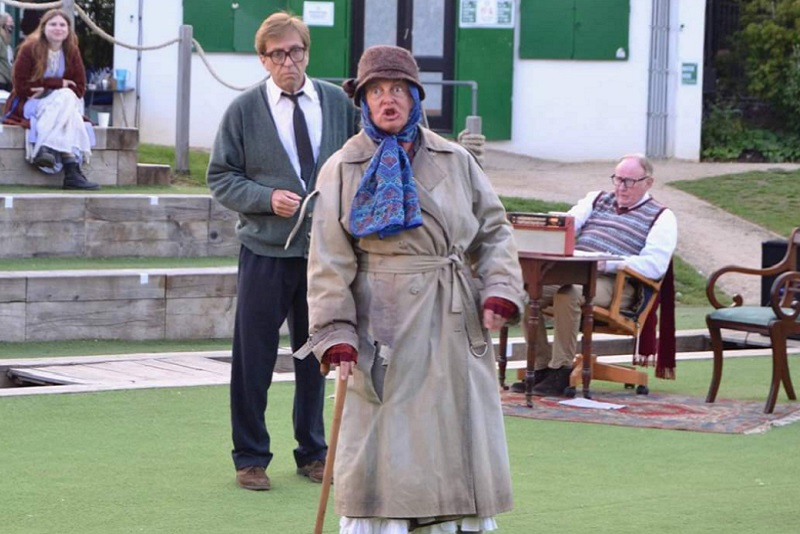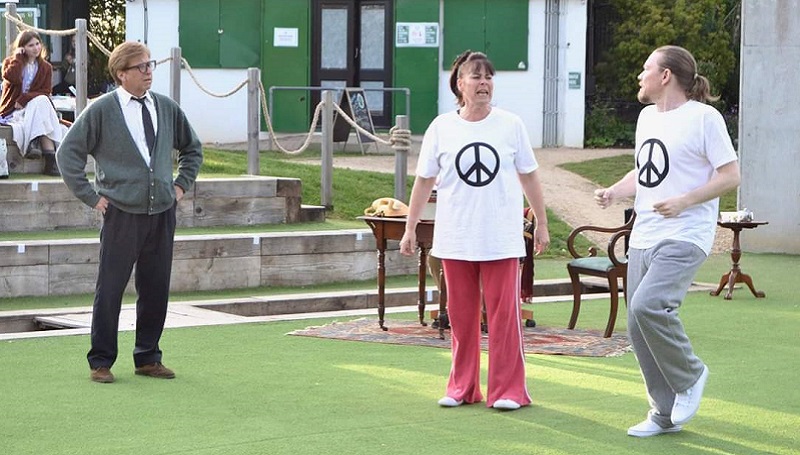“The Lady in the Van”: Alan Bennett
Jeremy Malies at the Brighton Fringe
29 May 2021
Having decided to put himself on stage in The Lady in the Van, Alan Bennett soon realized that there would have to be two actors playing him. He sees a polarity in his psyche; one element is the Bennett who interacts with the outside world and the other is the Bennett who reflects on life and turns it into drama.
Traipsing through the city during the Brighton Fringe to the Brighton Open Air Theatre (BOAT), I pondered the challenge confronting any company that mounts this play. You need two actors who can do those stately west-Leeds vowels. Bennett is of course richly imitable but retaining the accent through a script that is linguistically dense and studded with allusions to now-distant cultural figures is asking a lot. In Nathan Ariss (Bennett No. 1) and Paul Moriarty (Bennett No. 2), the Sarah Mann Company has a pair of performers who can stay the course. Moriarty is particularly effective in delving into Bennett’s dilemma of observing somebody suffering, responding with a great deal of patience and not a little material help, but knowing all the time that he will be compelled to write a play about his visitor exposing – in no particular order – her pretensions, hypocrisy, and woeful hygiene regime.

Nathan Ariss, Sarah Mann and Paul Moriarty. Image courtesy Sarah Mann Theatre Company.
As the title character, Sarah Mann takes a while to inhabit her role and there is some flutiness reminiscent of Lady Bracknell (a role she has played) in the opening exchanges. Mann is at her best and most touching when recalling the air raid duties during the London Blitz (where she may have watched her fiancé being killed by a bomb) and which undoubtedly turned her wits. Mann begins to mine the dialogue forensically when showing us that while her character might have a veneer of gentility, her manners are in fact abysmal. As for what Bennett calls her “odoriferous concerto”, the actor conveyed it so successfully that at times I was grateful we were outside in a sea breeze.
I often wonder why BOAT is only yards from a busy main road and in an area which is by no means a natural amphitheatre. It’s the very opposite of the Proustian soundproofing cork-lined study that Bennett mentions in the text. Good gags (some of them about entry to the European Economic Community or Common Market/EU) were inaudible, and I was only aware of them because I had the text with me. You would need the hearing of a bat to pick up everything, especially with Bennett No. 2’s writing desk being placed upstage and Bennett No. 1 rarely venturing near the audience. (Saying this, it would take Brian Blessed on steroids to hit the back row with every line.) There may have been a social distancing aspect to the positioning of the actors but at an outdoor venue I doubt it; my guess is that directors Nick Bartlett and Janette Eddisford made some bizarre blocking decisions.
The titular van is also disappointing. Phone up any major props agency, and they will offer you a full or a sliced-in-half Volkswagen camper van so popular is the play. (Strictly speaking it should be a Bedford.) But here we have no more than a nondescript car radiator, a four-wheeled base, steel curtain rods, and drapes.

Nathan Ariss, Pip Henderson and Jack Kristiansen. Image courtesy Sarah Mann Theatre Company.
Despite weaknesses in the staging there is much good work, notably from Pip Henderson in a multitude of roles including a yuppie neighbour, a jargon-spouting social worker and even Bennett’s mother Lillian, a role that had me checking the cast list so wonderful was her transformation and so quick the costume change. Henderson also proves adept when tapping into the non-stop theme of lavatorial humour prompting Bennett No. 1 to reflect: “What memory was to Proust, lavs are to my mam.”
Ultimately the play is about territory and the need for the outward-facing Bennett to defend his turf and lay down a few boundaries that limit how far
Miss Shepherd can invade. It’s a Pinteresque struggle over territory (The Caretaker is referenced) and co-director Nick Bartlett milks this with some delicious walk-ons as a comedy of menace thug who may have been blackmailing Miss Shepherd. Even on a perfect early summer afternoon there were venue-based shortcomings but insofar as they were merely acoustic it should be noted that BOAT is urban and accessible by public transport, which is rare for an outdoor theatre. It was great to be able to unmask if only for a few minutes and if my breathing was shallow, it was wariness of Miss Shepherd’s odours rather than fear of Covid.









